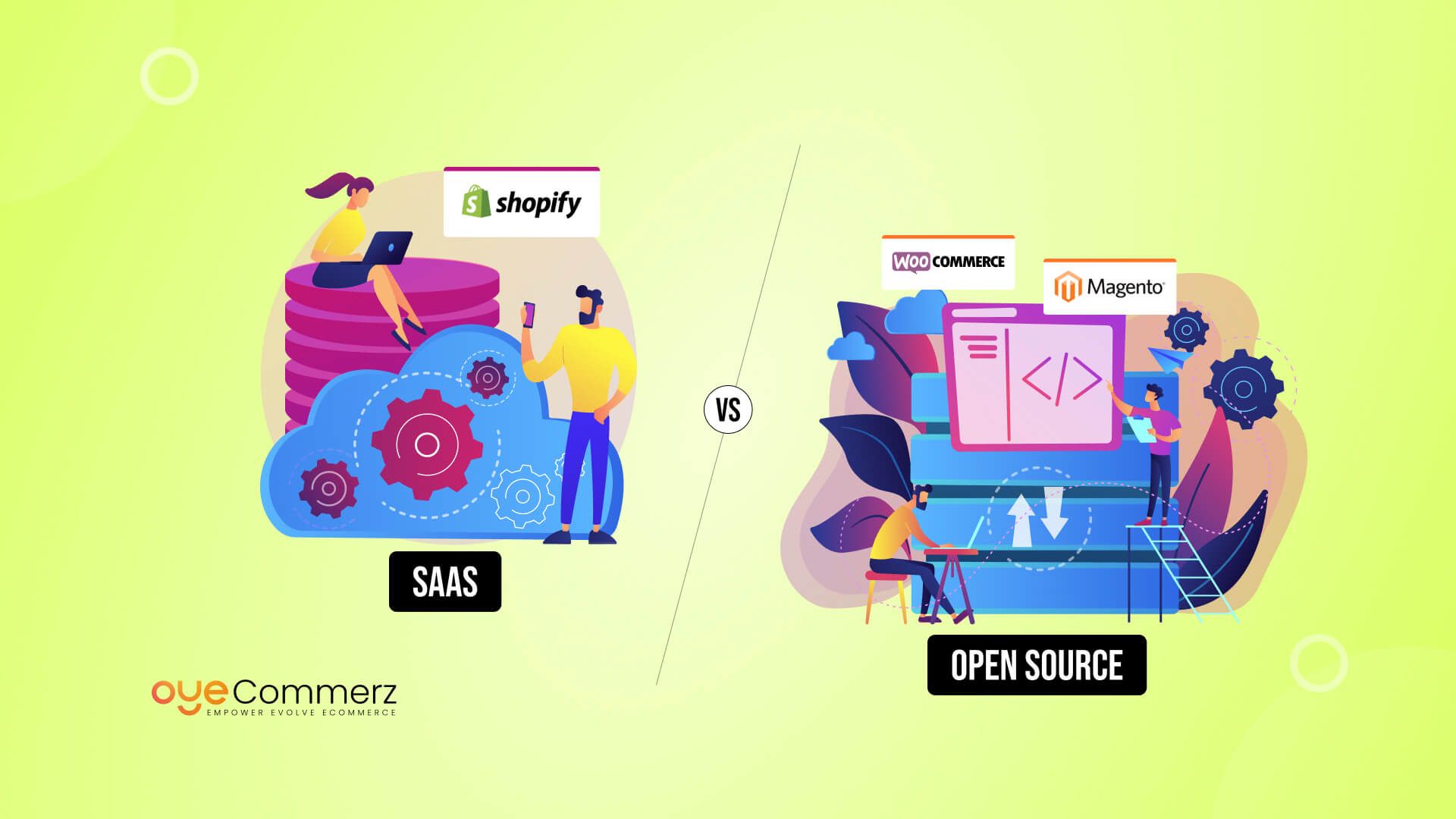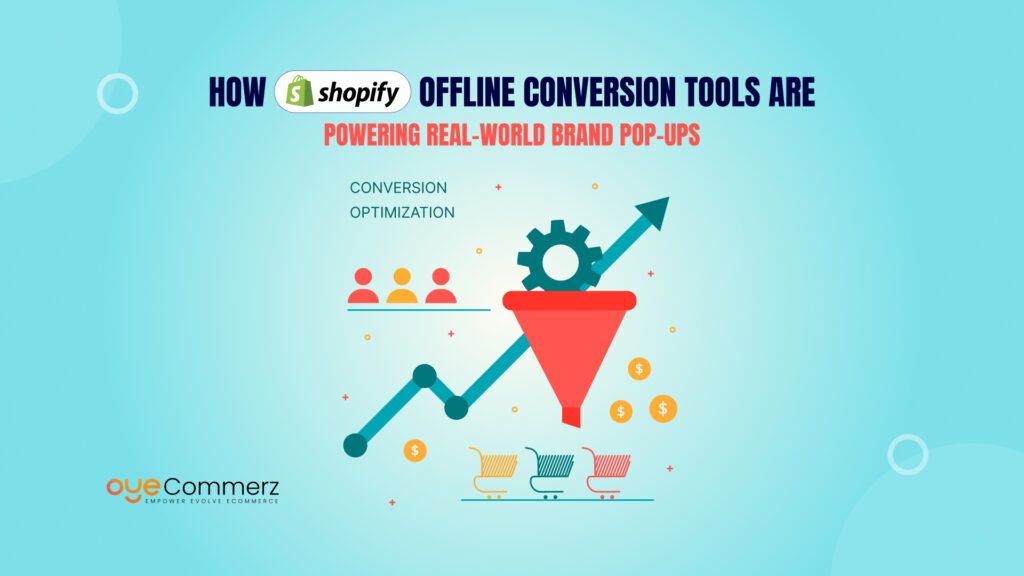The SaaS eCommerce platforms provide business owners with easy beginnings for their online stores; they need to trouble themselves with no server configurations, security patches, or complex coding.” Businesses that go for such unrestricted altitudes are justified in taking their leave from local installations of open-source solutions such as WooCommerce or Magento. Good justifications include more usability and less technical pressure on oneself.
This article would discuss why this migration is occurring, examine the difference between the SaaS and open-source platforms, and outline why so many online entrepreneurs are setting their sights on the Shopify migration.
Table of Contents
ToggleUnderstanding the Landscape: SaaS vs. Open-Source eCommerce
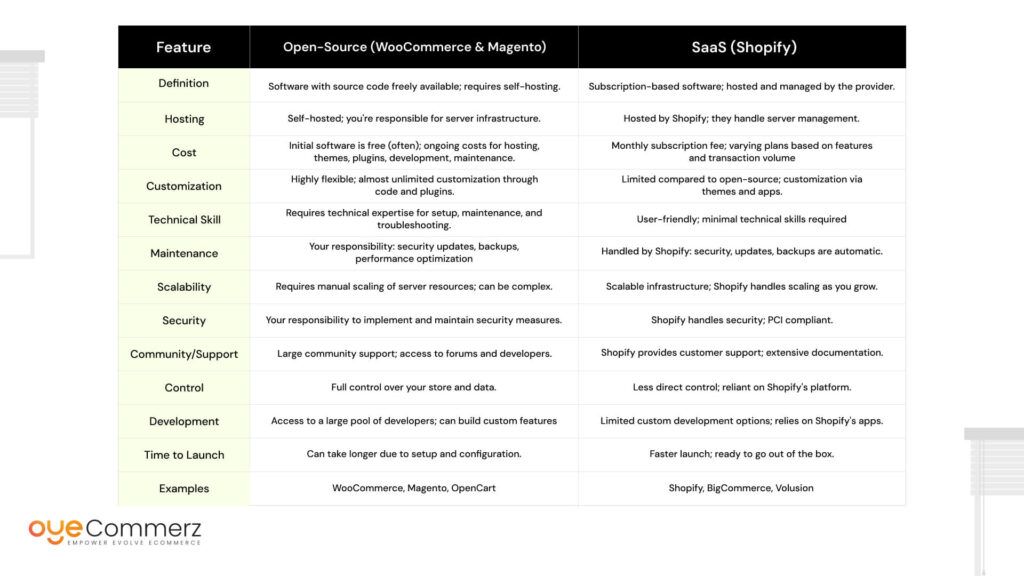
Key Points Summarized:
- Open-Source: Offers maximum flexibility and control but requires technical expertise and ongoing maintenance. Best for businesses with development resources and complex needs.
- SaaS: Provides ease of use and convenience, handling the technical aspects.
Ideal for businesses that prioritize simplicity and speed.
The Shift: Why Businesses Are Choosing Shopify
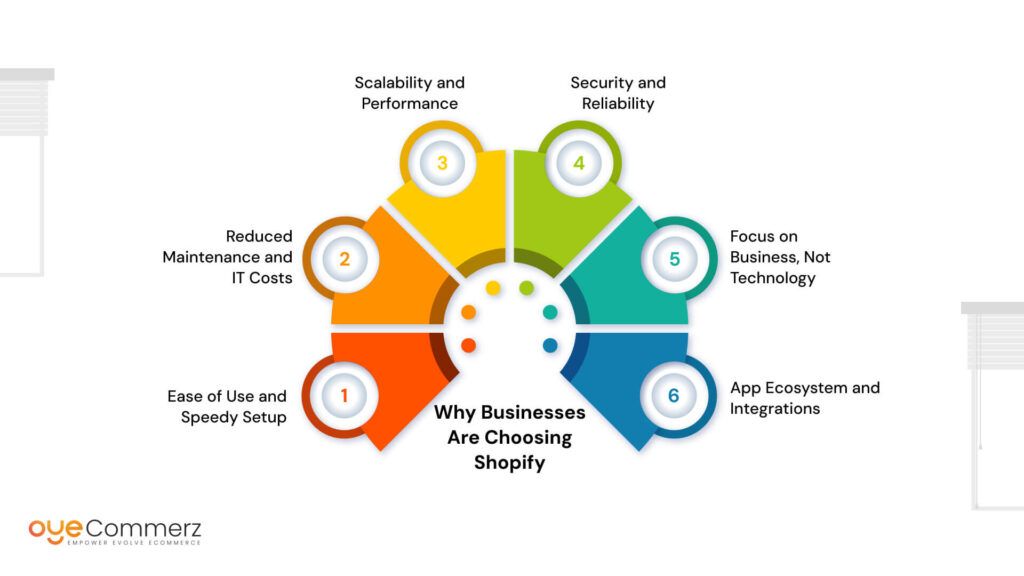
1. Ease of Use and Speedy Setup:
Shopify: Picture this: Setting up your online store in one afternoon. With its simple drag-and-drop interface, Shopify enables users to customize the store design at will, add products to the store, and even set payment gateways without needing programming knowledge. Their intuitive dashboards help the user manage orders, track inventory, and analyze sales easily. It’s like LEGO!
WooCommerce/Magento: These platforms feel more like building a house from scratch. You find your hosting, install the software, choose your theme, configure your plugins, and possibly hire a developer to take care of the nuts and bolts. This process would take days, weeks, or even months, particularly if you are a technology expert. Even the easiest design updates might require coding or hiring a developer.
Example: A small clothing boutique owner with limited tech skills would probably be able to set up a basic Shopify store advertising their products in a few hours. The same would not be true for WooCommerce, which may require hiring a developer for theme customization and plugin integration, adding time and costs to the equation.
2. Reduced Maintenance and IT Costs:
Shopify: Shopify is the one taking care of all the technical heavy lifting. They take care of hosting, security updates, software maintenance, and backups. This means you can sit comfortably knowing that you do not have to worry about server downtimes, security vulnerabilities, or compatibility issues. You just pay for your subscription monthly, and they will do the rest.
WooCommerce/Magento: Each of these is the area you have to look after. You will have to pay for hosting and may need a system admin to manage your server, and this makes sure that all your software and plugins are up-to-date.
Example: A growing business could save significantly by switching to Shopify. Instead of paying a part-time IT person to manage their WooCommerce store, they can allocate those resources to marketing or customer service.
3. Scalability and Performance:
Shopify: Shopify’s infrastructure can be set up to easily absorb the load of increased transactions and traffic as your business grows. Besides its infrastructure, Shopify has the support of built CDN services, thereby ensuring the swift loading of your website for visitors across the globe. No crash worries arise during peak seasons!
WooCommerce/Magento: Scaling your open-source store can get tricky; you might need to upgrade your hosting plan, optimize your database, and even spend on load balancing solutions. An incorrectly handled instance could lead to lags or even crashes on your website during times of heavy traffic, causing loss of sales.
Example: During a flash sale, a Shopify store can seamlessly handle an influx in traffic with no performance hit, while a WooCommerce store on a shared hosting plan might be very much delayed, angering customers with slow loading.
4. Security and Reliability:
Shopify: Security is a major concern at Shopify. They are PCI DSS compliant, meaning they satisfy the highest security standards concerning credit card information handling. In addition, they have robust features to protect your store against hacking attempts and data breaches.
WooCommerce/Magento: Security is your concern. You have to enforce security implementations; keep your software updated; be vigilant toward any potential vulnerabilities. Security breach could take a toll on your reputation and cause you financial loss.
Example: Shopify’s inbuilt security is something to be relied upon, giving business owners assurance that their customer’s information is safe. Whereas in WooCommerce stores, store owners will pay for a security plugin and get their websites audited for vulnerabilities regularly.
5. Focus on Business, Not Technology:
Shopify: It allows you to take care of the technical aspects so that your focus remains on the most important part of all: the business. You become free to actually think about marketing, sales, customer service, and product development, leaving the technical details to Shopify.
WooCommerce/Magento: Getting involved with the technical work of your store can take up a lot of your time. You would be stuck with far more technical-tuning days than actual strategizing for your business.
Example: A small business owner might use Shopify to launch an impressive marketing campaign and enhance the relationship with his customers rather than spending hours trying to solve a plugin conflict.
6. App Ecosystem and Integrations:
Shopify: Shopify has an extensive app ecosystem with thousands of apps that add further capabilities to your store. Everything from email marketing integration to social media integration, you can find apps that connect Shopify with other tools your business uses.
WooCommerce/Magento: While alternative platforms have plugin ecosystems, the downside is clashes in compatibility and it may take time to find the plugin.
Example: A Shopify store owner connects to his email marketing tool via an app in the app store. A WooCommerce store owner might consider hiring a developer to create a custom integration.
Shopify's Specific Advantages (Why Shopify is Winning)
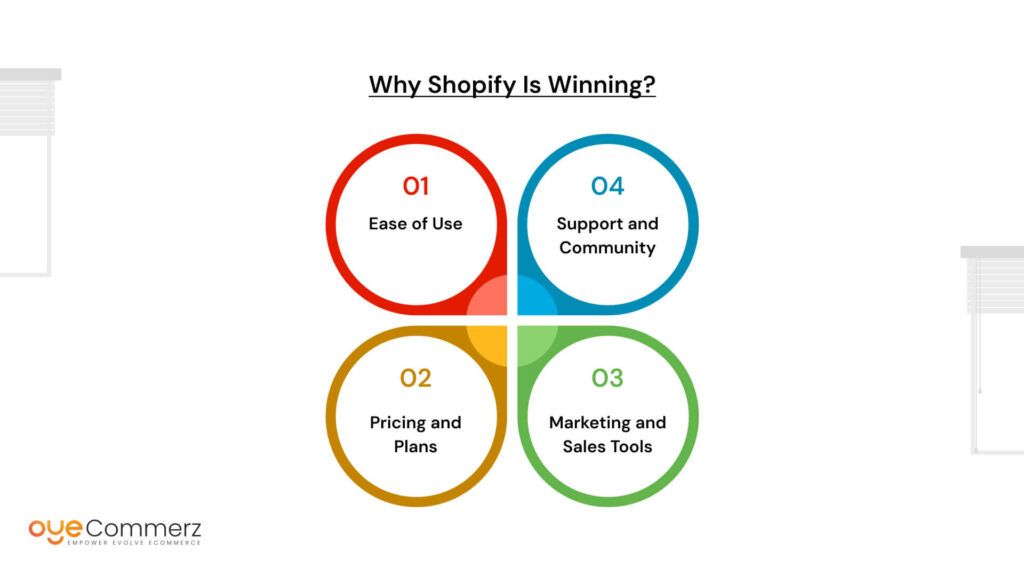
1. Ease of Use:
- Easy to Work: Every aspect of store management really highlights Shopify’s user-friendliness. Store Setup: Forget about some complex installation and server configuration. With clear instructions from Shopify, the user is virtually guided through the setup and can get her or his store up and running in no time. In a matter of hours, one could select a theme, customize its look and feel, and add his or her products.
- Product Management: Adding and managing products is very, very easy. You go in there, upload images for products, write a description, enter a price, set up your inventory, and be done. To make things even better, Shopify saves time with features like bulk editing and automated inventory tracking.
- Order Processing: Shopify gives you the tools to run smooth order fulfillment operations. Orders can be viewed and managed from a single dashboard; along with printing shipping labels, tracking shipments, and emailing confirmations to customers, they are kept updated via automated notifications on new orders and their statuses.
- Theme Customization: Shopify supplies dozens of professionally designed themes that you can customize for brand alignment. The drag-and-drop theme editor allows you to change colors, fonts, layouts, and other design elements without requiring any coding knowledge.
2. Pricing and Plans:
Shopify offers a tiered pricing structure designed to cater to businesses of all sizes:
- Basic: For new businesses and startups, this plan has basic features like online store building, unlimited products, and basic reporting.
- Shopify: For growing businesses, this package adds features such as gift cards, professional reporting, and lower transaction fees.
- Advanced: Meant for larger businesses with high volume of sales, this package provides advanced features concerning real-time shipping calculations as well as third-party shipping integrations.
- Shopify Plus: An enterprise-grade solution for high-volume merchants, allowing a customized feature set and dedicated support as well as advanced scalability.
Value proposition: Shopify’s pricing plans offer the best value for the money and are favorably compared to hosting, maintenance, and development costs of open-source platforms. The tiered structure allows businesses to select a plan that meets their current needs while also offering an upgrade path as necessary.
3. Marketing and Sales Tools:
This functionality includes built-in marketing and selling tools to help you attract customers and sell products:
- Abandoned Cart Recovery: Shopify automatically sends an email to customers who leave items in their cart with no intention of purchase, reminding them to finish their order. This is a strong way to recover lost sales.
- Email Marketing Integration: These integrations allow merchants using Shopify to set up email lists, send newsletters, and perform targeted email marketing.
- Social Media Integration: A store can link itself easily with social media accounts, from where products will then be promoted and traffic referred to the online store.
- SEO tools: Shopify is furnished with SEO Experts to optimize its store for search engines.
- Analytics and Reporting: Analytics provide detailed reporting with insights on sales, traffic, and customer behaviors regarding the performance of the store.
Example: The owner may take a store’s advantage by activating the abandoned cart recovery feature, which automatically sends reminders to the customer regarding items left behind, thus enhancing the completion of purchases.
4. Support and Community:
Shopify customer service is very helpful with an active community:
- Help 24/7: Anyone can reach out to Shopify via calling, emailing, or live chat any time of the day. From technical questions to asking how to set up a store, their support personnel will guide you through any issue.
- Extensive Documentation: Shopify has a good collection of knowledge bases, such as articles, tutorials, and videos, covering just about everything on the platform.
Active Community Forums: The Shopify community forums are great for asking questions, sharing tips and best practices, and connecting with other Shopify users.
Shopify for Different Business Types
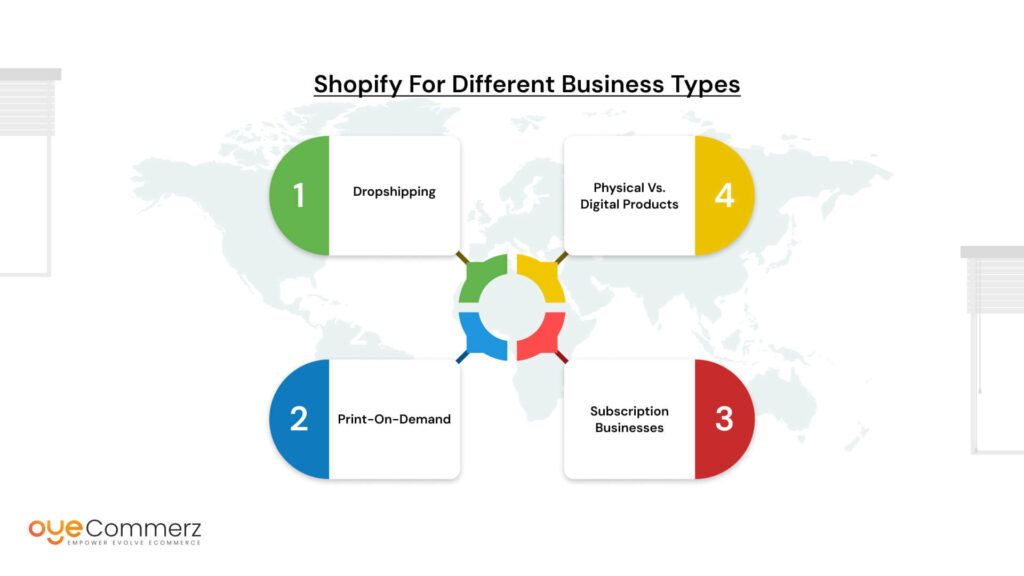
Let’s explore how Shopify caters to different business models and niches:
1. Dropshipping:
Shopify has become the preferred platform for dropshipping due to its user-friendliness and compatibility with several dropshipping applications.
- Simple Fulfillment: Inventory is not needed as products are shipped directly to the customer by a dropshipping supplier immediately after a customer places an order. With Shopify, the process is made easy by supporting applications such as Oberlo, Spocket, and DSers, which allow you to import products from suppliers, automate order fulfillment, and track shipments.
- low start-up costs: Setting up a dropshipping business with Shopify demands little in the way of startup costs. You will not need to purchase inventory, rent warehouse space, or possibly deal with shipping logistics. All of these factors make dropshipping an interesting choice for a budding entrepreneur with little capital at his disposal.
- Product Variety: You can keep a wide variety of products without stocking any of these products. This creates opportunities for testing several niches in search of profitable products.
- Automation: Shopify applications automate almost every aspect of dropshipping, such as order processing, inventory updates, and tracking information. This saves a lot of time and reduces the possibility for mistakes.
2. Print-on-Demand:
Among many other benefits, Shopify’s POD service integration enables easy selling of custom products without having to incur upfront costs or deal with inventory management.
- Customizable Products: Create and sell a variety of customizable products, including T-shirts, mugs, phone cases, etc.
- No Inventory: You do not need to carry an inventory as POD services print and ship your products.
- Easy Integration: Shopify integrates many POD services, e.g., Printful, Printify, Gelato Purchase. Once integrated, the buyer can push customer orders and track shipments.
- Branding: Many POD services come with white-labeling, enabling branding of your products and packaging.
Example: An artist can set up a Shopify store and use a POD service to sell their artwork on a wide variety of products. They simply upload their designs, choose the products they want to sell, and get started. The POD service takes care of printing and shipping, while the artist pockets profit from each sale.
3. Subscription Businesses:
Shopify facilitates subscription-based businesses via apps and integrations.
- Recurring Billing: Apps like ReCharge, Bold Subscriptions, or Paywhirl allow you to set up your subscription products or services on recurring billing.
- Automated Renewals: This automation streamlines the renewal processes, allowing you to keep receiving payments from your subscribers.
- Subscription Management: Subscribers can be easily managed and their subscriptions tracked, with multiple subscription options offered.
- Customer Retention: Features to keep customers subscribed are sometimes included as part of the subscription app’s functionality, such as email reminders and cancellation prevention tools.
Example: A meal kit delivery service could use Shopify plus a subscription app to manage its subscribers, process recurring payments, and provide different meal plan options.
4. Physical vs. Digital Products:
Shopify provides seamless selling procedures for both product types.
- Physical Products: All the tools needed to manage physical products, such as inventory tracking, shipping integration, and order fulfillment, are provided by Shopify.
- Digital Products: You can sell digital products such as ebooks, courses, and software through apps like Digital Downloads, which allow you to securely deliver purchased files to your customers.
- Membership Access: Using apps, one can set up membership sites and provide content or access restricted to its members.
Example: A musician can sell CDs and digital downloads from their Shopify store. He may also introduce an app for membership to give exclusive content and behind-the-scenes access to his fans. A software firm may sell its software on Shopify and provide the customer download links after purchase.
Catering to these various business models and supporting both physical and digital products, Shopify offers a fantastic platform for just about every kind of online business.
Simplify Your eCommerce with SaaS: Start with OyeCommerz
Business on the Shopify platform is made easy due to its user-friendly interface, easy upkeep, and the capacity to scale with great features for business development. SaaS eCommerce, with Shopify in the forefront, makes online selling a breeze and a cost-effective venture. Are you ready to say goodbye to such tech hassles and embrace SaaS simplicity?
Explore Shopify through OyeCommerz and discover just how easy online selling can be. Get a Free Consultation today and build the online SaaS store you’ve always dreamed of.
Contact to Migrate your Site to Shopify Now
Conclusion
In short, the ease of use and relatively minimal maintenance of the Shopify platform, along with the capacity to scale and its solid feature set, have become central to business development, enough to make every enterprise opt for Shopify. Many businesses are even leveraging WooCommerce to Shopify migration services to make the transition seamless. SaaS eCommerce, with Shopify in the forefront, offers a fast and cost-effective way to get any online store running. Ready to simplify your eCommerce journey? Join OyeCommerz on Shopify today and see how it works for you.
Frequently Asked Questions
No, SaaS (Software as a Service) is not inherently open source. SaaS refers to software that is hosted in the cloud and accessed over the internet, usually through a subscription model. The software is maintained and updated by the service provider, and users typically do not have access to the underlying source code.
In contrast, open source software makes its source code available for anyone to view, modify, and distribute. While it is possible for a SaaS product to use open source components or even be built from open source software, the SaaS delivery model itself does not mean the software is open source.
| Feature | Open Source eCommerce | SaaS eCommerce |
|---|---|---|
| Hosting | Self-hosted by the user | Hosted by the provider |
| Customization | Full access to the source code | Customization within platform limits |
| Technical Requirements | Requires developer knowledge | User-friendly, minimal technical skills needed |
| Maintenance | Managed by the business or development team | Managed by the SaaS provider |
| Examples | Magento Open Source, WooCommerce | Shopify, BigCommerce |
| Cost | Software is free, but you pay for hosting, security, and development | Subscription-based pricing, includes hosting and support |
Software is a general term for any computer program or application, whether it is proprietary or open source.
Open source software specifically refers to software whose source code is freely available to the public. It can be modified, redistributed, and used by anyone, often under licenses like MIT, GPL, or Apache.
| Feature | Proprietary Software | Open Source Software |
|---|---|---|
| Source Code Access | Not accessible to users | Fully accessible |
| Modification Rights | Restricted | Permitted |
| Ownership | Controlled by the software vendor | Community-driven or open ownership |
| Cost | Usually requires purchase or license | Often free or donation-based |
| Examples | Microsoft Office, Adobe Photoshop | LibreOffice, GIMP, Linux |
Open source software promotes transparency, collaboration, and customization, while proprietary software focuses on centralized control and polished user experience.
SaaS (Software as a Service) refers to software that is delivered over the internet, typically via a subscription. Non-SaaS software includes both traditional desktop applications and self-hosted solutions that users install and manage themselves.
| Feature | SaaS | Non-SaaS |
|---|---|---|
| Access | Through web browser | Installed on local devices or servers |
| Hosting | Cloud-hosted by provider | Hosted on local machines or private servers |
| Updates | Automatic, managed by provider | Manual or semi-automated by user or IT |
| Pricing | Recurring subscription | One-time payment or licensing fee |
| Maintenance | Included with subscription | User is responsible for updates and fixes |
| Examples | Google Workspace, Salesforce, Shopify | Microsoft Office (desktop), Magento Open Source |
SaaS offers convenience and lower upfront costs, making it ideal for businesses that want to avoid managing infrastructure. Non-SaaS options are suitable for organizations that need complete control over their software and data.

